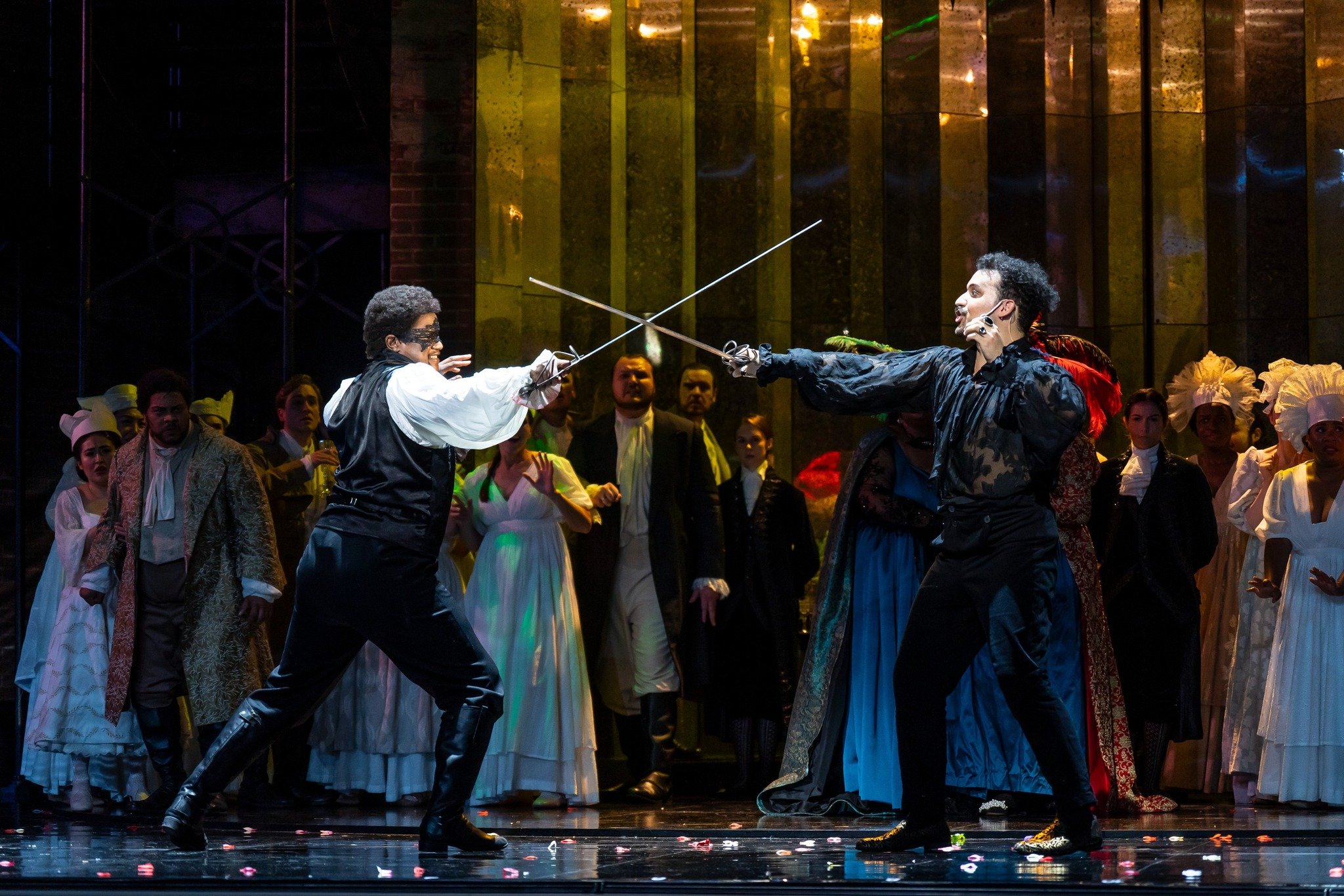A summer visit from the Barber of Seville delights Wolf Trap

Review: Rossini’s The Barber of Seville at Wolf Trap Opera
I very much hope the decision-makers at Wolf Trap noticed the full house last Friday for Rossini’s The Barber of Seville, the single performance of their only fully-staged opera at the Filene Center (Wolf Trap Opera puts on other productions in the tiny Barns theater nearby). During Wolf Trap’s first decade (it opened in 1971), it mounted several operas each summer, each in multiple performances, which also had to compete with those of visiting companies including the Met. We didn’t realize how lucky we were back then.
Yes, grand opera is expensive and can be risky, but the near-abandonment of the art form at the region’s premiere summer venue in favor of what’s there now is depressing. D.C. is not a cultural backwater, and the massive turnout for Barber (cast without any big-name singers) shows that perhaps Wolf Trap’s core assumptions are wrong. Opera can still draw an audience; and if future productions are of the quality of this one, they’d draw from far away as well.
Taylor Raven (Rosina ) and Chris Bozeka (Count Almaviva)
Kudos first and foremost to director Joan Font and designer Joan Guillén, who made an astonishing visual feast onstage, between the sets and the blocking. No “park n’ bark” here; the stage directions were almost as complex as the music, the large cast balancing both with admirable concentration. Though the production team did not use the entire space – the wings came out farther than normal -- what they did with it was dazzling. The two large structural screens, serving as the walls of the Bartolo house, were mesh, and the clever lighting design of Albert Faura allowed us to see action inside and outside simultaneously. In the first act, a giant guitar was brought out, big enough for a singer to climb up upon. A massive movable piece in the second act served as a writing desk, a piano, and a giant wedding cake, among other things. The gallimaufry in the finale was highlighted by a servant clowning around in a chandelier way overhead. The costumes – period, but sort of punched up, like in a comic book – made every character clear at a glance. This production was head and shoulders above anything in the company’s recent past.
It’s a bit harder to assess the musical aspects because Wolf Trap apparently feels it needs to Broadway-ize opera, with everyone and everything individually miked. Thus, the sound engineer at the back of the hall has more control over what we hear than the conductor. String pizzicatos rang out like pistol shots, a gentle guitar accompaniment sounded like Van Halen, every singer blared, and the blend within the orchestra and between stage and pit was painfully artificial. It’s one thing to have unobtrusive, generalized miking to project the sound out to the lawn patrons, but this garish electronic mix for the auditorium itself was unfortunate and unnecessary.
That said, my impression of the young cast, both flattened-out and distorted as they were, was mostly positive. The loveliest voice belonged to Christopher Bozeka (Almaviva), whose clean, ringing tenor, up to high C, gave consistent pleasure. Calvin Griffin (Bartolo) dazzled with both his soprano imitation and his machine-gun patter. Patrick Guetti (Basilio) needed amplification the least and should have a fine career in heavy operatic roles. Jonathan McCollough (Figaro) was good, but not a standout, and Taylor Raven (Rosina) was at times uncertain of pitch, though her voice was perfectly-placed for the part and often had a luminous quality. The smaller roles were all handled pleasingly, with no weak links.
Conductor Lidiya Yankovskaya had trouble keeping the complex ensembles together, and her pacing of the overture was drab. But in the arias, she followed the singers through all their expansions and roulades to a “T.” And although balances were out of her hands for the most part, the orchestral playing was always of high quality.
The artistic compromises that must be made in such a large, open-air venue as the Filene Center may irritate aficionados, but in terms of bringing the essence of Rossini’s genius to the largest number of patrons at one time, this has to be scored as a big success. I very much hope this will be a corner-turning event in Wolf Trap’s future planning.
L to R: Johnathan McCullough (Figaro), Jeremy Harr (Officer ), Patrick Guetti (Don Basilio), and Calvin Griffin (Don Bartolo). Photos by Johnathan McCullough
Pictured at top: Chris Bozeka, Taylor Raven, Patrick Guetti, Niru Liu, and Calvin Griffin. Photo by Johnathan McCullough.







